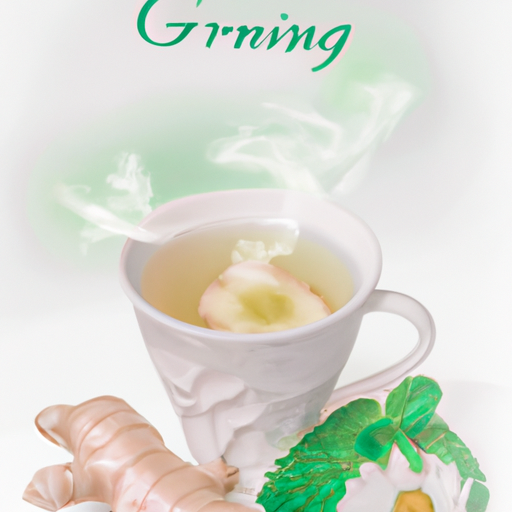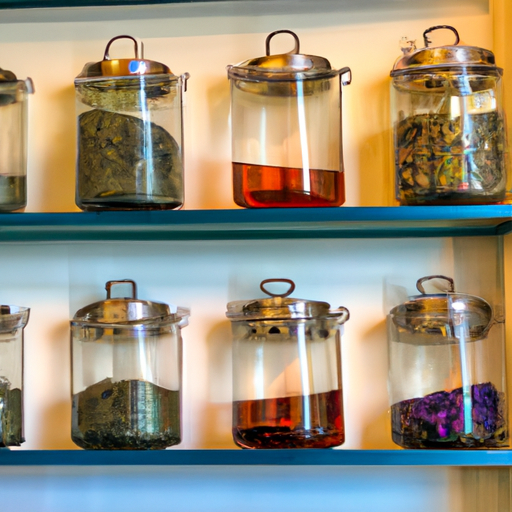Approximately 70% of individuals will experience nausea at some point in their lives. If you are one of them, know that you are not alone.
Nausea can be an unpleasant and disruptive sensation, but fortunately, there are natural remedies that can help ease this discomfort. One such remedy is herbal tea. Herbal teas have been used for centuries to support overall well-being and provide relief from various ailments, including nausea.
In this article, I will share with you some evidence-based herbal teas that are known for their effectiveness in alleviating nausea. From the refreshing and soothing peppermint tea to the warming and calming chamomile tea, these herbal infusions can provide much-needed relief when you’re feeling queasy.
So, if you’re looking for a natural and holistic approach to managing your nausea, keep reading to discover which herbal tea might be the perfect fit for you.
Key Takeaways
- Peppermint tea can calm an upset stomach and relieve nausea.
- Ginger tea settles the stomach and reduces feelings of queasiness.
- Chamomile tea reduces inflammation in the gastrointestinal tract and soothes digestion.
- Lemon balm tea has calming properties and can relieve symptoms associated with nausea.
Peppermint Tea
If you’re feeling queasy, try sipping on a cup of refreshing peppermint tea that’ll instantly transport you to a soothing garden filled with vibrant green leaves and invigorating minty aromas.
Peppermint tea has long been known for its ability to calm an upset stomach and relieve nausea. The menthol in peppermint acts as a muscle relaxant, soothing the gastrointestinal tract and reducing spasms that can cause discomfort. This natural remedy isn’t just delicious but also has scientific evidence supporting its effectiveness in alleviating nausea.
In addition to peppermint tea, there are other herbal remedies that can help ease nausea. Ginger tea, for example, has been used for centuries to settle the stomach and reduce feelings of queasiness. Ginger contains compounds called gingerols that have anti-inflammatory and antioxidant properties, which can help reduce inflammation and soothe the digestive system.
Transitioning to ginger tea, this herbal remedy also holds promise in relieving nausea. So, if you’re looking for a natural way to soothe your stomach and ease feelings of queasiness, both peppermint tea and ginger tea are excellent options to consider.
Ginger Tea
Ginger tea is a fantastic herbal remedy that I often turn to when I have an upset stomach. It’s been used for centuries to settle digestive issues and reduce nausea. The active compounds in ginger have been found to have anti-inflammatory and antiemetic properties, making it effective in relieving symptoms of motion sickness as well.
Settles Upset Stomach
When you’re feeling queasy, chamomile tea can work wonders in soothing your upset stomach. Chamomile has been used for centuries as a natural remedy to settle the stomach and soothe digestion. Its anti-inflammatory properties help reduce inflammation in the gastrointestinal tract, alleviating symptoms such as nausea, bloating, and stomach cramps. Additionally, chamomile tea contains compounds that relax the muscles of the stomach and intestines, promoting healthy digestion.
To give you a better understanding, here’s a table that highlights the key benefits of chamomile tea for an upset stomach:
| Benefits of Chamomile Tea for Upset Stomach |
|---|
| Reduces inflammation in the GI tract |
| Relieves nausea and stomach cramps |
| Promotes healthy digestion |
By incorporating chamomile tea into your routine, you can experience relief from an upset stomach and enjoy a more comfortable digestion process. This natural remedy not only settles an upset stomach but also reduces nausea and motion sickness.
Reduces Nausea and Motion Sickness
Chamomile tea works like magic in calming your queasy stomach and relieving the discomfort of motion sickness. It has been used for centuries as a natural remedy for reducing morning sickness and travel sickness.
When sipped slowly, chamomile tea can help soothe your stomach and reduce nausea effectively. Its anti-inflammatory properties help relax the muscles in your digestive system, preventing them from cramping and causing discomfort. Additionally, chamomile tea contains compounds that have a calming effect on your nervous system, which can alleviate the symptoms of motion sickness.
Markdown bullet list:
- Reduces nausea and morning sickness
- Soothes an upset stomach
- Calms the muscles in the digestive system
Transition: Now that we understand how chamomile tea can reduce nausea and motion sickness, let’s delve deeper into the benefits of this incredible herbal tea.
Chamomile Tea
Chamomile tea is a fantastic option when it comes to calming the digestive system and alleviating nausea and indigestion. It’s been used for centuries as a natural remedy for digestive issues, thanks to its anti-inflammatory properties. The soothing effects of chamomile can help relax the muscles in the digestive tract, reducing discomfort and promoting healthy digestion.
Calms the Digestive System
To soothe your upset stomach, try sipping on a cup of peppermint tea. Peppermint has long been known for its calming effect on the digestive system, improving digestion and soothing the stomach. The menthol in peppermint tea helps to relax the muscles of the gastrointestinal tract, reducing spasms and relieving discomfort.
This herbal tea also has antibacterial properties that can help combat bacteria that may be causing nausea or indigestion. Additionally, peppermint tea can alleviate symptoms of bloating and gas, making it a great choice for those experiencing digestive issues.
So, if you’re looking for a natural remedy to alleviate nausea and indigestion, a cup of peppermint tea might just do the trick.
Alleviates Nausea and Indigestion
Sipping on a cup of peppermint tea can work wonders in soothing your upset stomach and bringing relief to your uneasy gut. Peppermint has been used for centuries as a natural remedy for alleviating nausea and indigestion. It contains menthol, which has antispasmodic properties that can help relax the muscles of the gastrointestinal tract, reducing feelings of nausea. Additionally, peppermint tea can help to alleviate indigestion by promoting the flow of bile and improving digestion.
To further understand the benefits of peppermint tea for nausea, let’s take a look at the following table:
| Peppermint Tea Benefits for Nausea |
|---|
| Soothes upset stomach |
| Reduces feelings of nausea |
| Promotes digestion |
As we move on to discussing fennel tea, another herbal remedy for nausea and indigestion, it’s important to explore the unique properties it offers.
Fennel Tea
When you drink a warm cup of fennel tea, your queasy stomach will feel instantly soothed as the aromatic flavor envelops your senses. Fennel tea has been used for centuries to alleviate nausea and indigestion, making it a popular choice for those seeking natural remedies.
The benefits of fennel tea extend beyond its calming effect on the stomach. It’s also known to relieve gas and bloating, making it a great choice for those experiencing digestive discomfort. Fennel tea can be enjoyed on its own or mixed with other herbs to create flavorful blends.
One simple recipe involves steeping fennel seeds in hot water for about 10 minutes and then adding a touch of honey for sweetness. The result is a warm and comforting beverage that not only tastes delicious but also provides relief for your upset stomach.
As we move on to discuss lemon balm tea, another herbal remedy for nausea, you’ll discover even more options for soothing your digestive system.
Lemon Balm Tea
After discussing the benefits of Fennel Tea for nausea, let’s dive into the world of Lemon Balm Tea. As a herbal remedy, Lemon Balm has been used for centuries due to its numerous health benefits. This citrus-scented herb belongs to the mint family and is known for its calming properties.
Lemon Balm is widely used to alleviate anxiety and promote relaxation. Research suggests that it may increase the levels of gamma-aminobutyric acid (GABA) in the brain, a neurotransmitter that helps regulate anxiety. By calming the nervous system, Lemon Balm can help relieve symptoms associated with nausea, such as stomach discomfort and tension.
To further understand the benefits of Lemon Balm Tea, here are three key points:
-
Stress relief: Lemon Balm has been shown to reduce stress and promote a sense of calmness, making it an ideal choice for those experiencing nausea due to anxiety.
-
Digestive aid: This herbal tea can help soothe the digestive system, reducing nausea and bloating.
-
Antioxidant properties: Lemon Balm contains compounds that help fight oxidative stress and inflammation, which can contribute to feelings of nausea.
With the knowledge of Lemon Balm’s benefits for nausea, let’s explore the next herbal tea in our holistic journey: the peppermint and ginger blend.
Peppermint and Ginger Blend
Peppermint and ginger blend is a powerful combination that offers multiple benefits for nausea relief. This herbal blend has been used for centuries to soothe upset stomachs and reduce feelings of queasiness. Not only does it provide relief from nausea, but it also enhances digestive health by promoting the proper functioning of the digestive system.
The active compounds in peppermint and ginger work together to alleviate symptoms and provide a holistic approach to managing digestive discomfort.
Combined Benefits for Nausea Relief
To alleviate nausea, you can try sipping on a comforting cup of ginger tea. Ginger has long been used as a natural remedy for morning sickness during pregnancy and is known to help prevent motion sickness while traveling. Its soothing properties can calm an upset stomach and reduce feelings of queasiness.
Additionally, ginger tea can alleviate nausea caused by chemotherapy or surgery. The warm and aromatic nature of this herbal tea provides a sense of comfort and relief, making it a popular choice for those experiencing nausea.
Not only does ginger tea help with nausea relief, but it also enhances digestive health by promoting healthy digestion and reducing inflammation in the gastrointestinal tract.
Transitioning into the next section, let’s explore how ginger tea can improve overall digestive well-being.
Enhances Digestive Health
Ginger tea works wonders for your digestion, soothing your stomach and promoting a healthy gut. The active compounds in ginger, such as gingerol, have been shown to enhance digestion by stimulating the production of digestive enzymes and improving nutrient absorption. This herbal tea also helps to reduce inflammation in the gut, which can alleviate symptoms of nausea and promote overall digestive health.
Ginger has been used for centuries in traditional medicine to treat various digestive issues, including indigestion, bloating, and stomach pain. It’s a natural remedy that can be easily incorporated into your daily routine to support your digestive system.
As we transition into the next section about licorice root tea, it’s important to note that this herbal tea also offers numerous benefits for nausea relief.
Licorice Root Tea
Imagine yourself sipping on a warm cup of licorice root tea, soothing your stomach and easing your nausea. Licorice root tea has been used for centuries to promote digestive health and relieve various gastrointestinal issues, including nausea. It contains compounds that possess anti-inflammatory and anti-ulcer properties, which can help calm an upset stomach and reduce the feeling of nausea.
One of the key benefits of licorice root tea is its ability to soothe the digestive system. Licorice root contains glycyrrhizin, a compound that’s been shown to protect the stomach lining and reduce inflammation in the gastrointestinal tract. This can help alleviate symptoms of nausea by reducing the irritation in the stomach.
However, it’s important to note that licorice root tea should be consumed in moderation. Excessive intake of licorice root can lead to side effects such as high blood pressure, low potassium levels, and hormonal imbalances. It’s always advisable to consult with a healthcare professional before incorporating licorice root tea into your daily routine, especially if you have any pre-existing medical conditions or are taking medications.
Licorice root tea can be a beneficial herbal remedy for nausea. Its natural compounds provide digestive support and help alleviate symptoms of an upset stomach. Remember to enjoy licorice root tea in moderation and seek medical advice if you have any concerns about its potential side effects.
Frequently Asked Questions
Are there any potential side effects or risks associated with drinking herbal teas for nausea?
When using herbal teas for nausea relief, it’s important to consider potential interactions with certain medications and safety precautions. Understanding these factors can help ensure a holistic and evidence-based approach to using herbal teas.
Can herbal teas be used as a remedy for morning sickness during pregnancy?
Herbal teas can be used as a holistic remedy for morning sickness during pregnancy. They have been found to provide relief from nausea and are a safe, evidence-based option for expectant mothers.
How often should I drink herbal tea to alleviate nausea symptoms?
To alleviate nausea symptoms, I recommend drinking herbal tea regularly. The benefits of herbal tea include soothing the stomach and reducing nausea. However, it’s important to consult with a healthcare professional for the appropriate herbal tea dosage.
Are there any precautions or contraindications to consider when using herbal teas for nausea relief?
Precautions and contraindications should be considered when using herbal teas for nausea relief. It’s important to consult with a healthcare professional to ensure safety and avoid any potential interactions or adverse effects.
Can herbal teas be used in combination with other medications or treatments for nausea?
Yes, herbal teas can be used alongside nausea medications and other treatments. Research suggests that certain herbal teas, such as ginger and peppermint, can be effective in relieving nausea. However, it’s important to consult with a healthcare professional before combining any medications or treatments.
Conclusion
In conclusion, when it comes to finding relief from nausea, there are several herbal teas that have proven effective.
Peppermint tea, with its soothing and calming properties, can help settle an upset stomach.
Ginger tea has been used for centuries to alleviate nausea and aid digestion.
Chamomile tea can provide gentle relief and promote relaxation.
Fennel tea is known for its carminative properties, helping to ease bloating and discomfort.
Lemon balm tea can help soothe the digestive system.
And a blend of peppermint and ginger can offer a powerful combination for nausea relief.
Lastly, licorice root tea can help soothe and heal the stomach lining.
So the next time you find yourself feeling queasy, why not try a cup of herbal tea to ease your discomfort and promote overall well-being?










